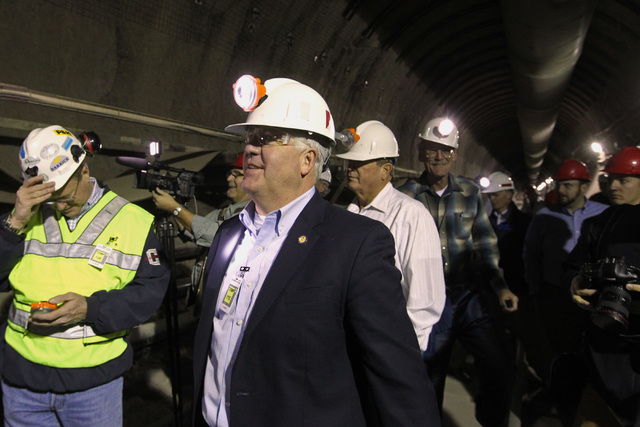
U.S. Rep. John Shimkus came to Nevada this week with an unpopular message: Why he’s pushing a bill that would revive the Yucca Mountain project in Nye County.
Shimkus, R-Illinois, spoke Tuesday to the Reno-Sparks Chamber of Commerce as his bill moves through Congress. It’s expected to soon come up for a vote in the House, but the bill that would put high-level nuclear waste in Yucca Mountain faces an uncertain fate in the Senate.
The Yucca Mountain project has been strongly opposed by Nevada’s congressional delegation, past and present, for decades.
Former U.S. Rep. Jon Porter, R-Nevada, said he has “spent a better part of my life fighting against Yucca Mountain,” and he made that point when introducing Shimkus to the gathering of about two dozen Reno business leaders.
Shimkus offered the group some national context: There are 39 states with spent nuclear fuel or defense waste in 121 locations. All need a place to store waste.
“In all honesty, we believe we have one of the best locations you could ever think of that’s been researched more than any piece of property on the planet,” Shimkus told reporters. “But it’s still a national treasure that we need to appreciate the state of Nevada hosting, and so we want to work with them.”
Tray Abney, director of government relations for the Reno-Sparks Chamber of Commerce, said the chamber doesn’t have a position on Yucca Mountain. He said the event was a good opportunity for the group to hear from Shimkus and a good chance for the congressman to directly interact with Nevadans about Yucca Mountain.
The bill undoes the prohibition that makes Nevada, as the hosting state, ineligible for benefits, he said. That allows a conversation about issues like how to transport the nuclear waste to Yucca Mountain, what routes and whether to rely on rail.
“The question of how it’s going to get there is where we can work well with the state on the best way is rail but then you eventually have to get it off rail to move it by truck,” Shimkus said, adding those can happen through negotiations.
He noted that through working with the state to identify a route, there could be routes with secondary benefits for development.
Nevada opposition, Nye County reaction
Nevada officials remain concerned and opposed to the bill. In an April letter to Shimkus, Gov. Brian Sandoval said the transportation and benefits provisions are “simply false promises that cannot be guaranteed or enforced.”
“No amount of monetary benefits can compensate for the coerced selection of an unsafe site,” Sandoval wrote.
Robert Halstead, executive director of Nevada’s Agency for Nuclear Projects, said in an email that the bill won’t keep shipments out of Las Vegas, and it invites the Environmental Protection Agency and Nuclear Regulatory Commission to change safety and environmental rules during the licensing proceeding.
Reached for comment, Nye County Commission Chairman Dan Schinhofen said in a statement that Shimkus’ “coming to the state to discuss Yucca Mountain with the Nevadans is a continuation of the outreach Shimkus has done in the past.”
Shimkus in the past attended a public meeting in Pahrump where he heard from the public and local elected leaders from rural Nevada counties, Schinhofen said. Shimkus also led the congressional delegation that visited Yucca Mountain in 2015. “He has also been willing to meet and work with Nye County commissioners and representatives in Washington D.C.,” Schinhofen said.
“We appreciate his willingness to engage with the leaders who live in the area and would be most impacted by any construction of a repository,” Schinhofen said. “We wish our own statewide leaders would do the same.”
“His statements in Reno are consistent with what we have said for years,” Schinhofen said. “There are lots of potential benefits for the state and local governments. Let’s finish the licensing process and see if it is safe.”
President Donald Trump has included $120 million in his fiscal 2018 budget to restart licensing for Yucca Mountain, designated in 1987 by Congress as the permanent repository for nuclear waste produced at power plants. The Energy Department submitted its application to the Nuclear Regulatory Commission in 2008 but withdrew it during the Obama administration in 2010 and defunded licensing operations.
The Pahrump Valley Times staff contributed to this story.